
6 minute read
Suquamish Tribe Back-to-School Resources Guide
Suquamish tribal youth returned to the classroom Aug 28, as the 2024-25 school year kicked off. Here’s an overview of some of the resources available to community students and parents.
Marion Forsman Boushie Early Learning Center
Main phone: (360) 394-8578
Interim Director: Kayla Wakefield
Open Monday-Friday from 7:30am-5pm School hours for EHS, HS, & ECEAP: 9am-4pm (Sept- July)
ECEAP Working Day & Childcare: 7:30am-5pm (year-round)
Childcare: 6-week-olds through 5th grade
Early Head Start: 1 & 2-year-olds
Head Start: 3–5-year-olds
Early Childhood Education and Assistance Program (ECEAP): 3–5-year-olds
Following changes to federal Head Start requirements, Tribal Council approved a new policy that will provide more ELC spots for Suquamish tribal member children and enrolled descendants, and members of other federally recognized tribes.
Chief Kitsap Academy

Grades 6-12
Main phone: (360) 394-8645
Principal: Jon Claymore
Vice Principal: Sarah Houseberg
One of the first tribal compact schools in the state, Chief Kitsap Academy is operated by the
Suquamish Education Division and is recognized by the Washington State Office of the Superintendent of Public Instruction. Programs at CKA are open to middle school and high school students. The vision of CKA is that every graduate is a confident, courageous, thoughtful, and respectful member of the community.
With 77 students enrolled at the start of the year, Chief Kitsap Academy is at capacity for most of its classes. CKA is also welcoming nine new teachers and staff to its 32-member staff, including Principal Jon Claymore and Assistant Principal Sarah Houseberg. (See profile on page 6.)
Intertribal Parent Education Committee
Contact: Cori Silvi csilvey@Suquamish.nsn.us / (360) 394-7103
Intertribal Parent Education Committee meetings are for parents and families of students enrolled in North Kitsap School District schools who are also members of a federally recognized tribe.
“We discuss updates from academic coaches,” says coordinator Cori Silvey, who is also the ELC’s Home Visiting Program Supervisor. “Native Liaisons through North Kitsap School District and parents also have an opportunity to ask questions of Suquamish and Port Gamble S’Klallam tribal government education leaders.”
“We explore ways to help indigenize academics for our tribal students,” she explained in response to a question at a recent Lunchtime Forum. “Conversations focus on student wellness, prevention, transportation, attendance all come up during these meetings.”
The committee meetings also provide a “safe space where parents can share stories or look for support, or share what their students are experiencing,” Silvey said. Not only can their students be successful in the school district, but as parents, they, too, can be successful in supporting their students and navigating the school district, which sometimes feels like unfamiliar territory.
Silvey encourages all tribal parents to consider attending the committee’s first meeting of the new school year on Sept. 27 to “see if the vibe right for them.” On the agenda for that first meeting will be election of committee leaders, and plans for meetings for the rest of the school year. “I try my best to
facilitate conversations, but I really like collective decision making for parents and making the meetings as accessible to them as possible.”
Look for information about upcoming meetings in the Suquamish News and on the Suquamish Tribe’s Facebook.
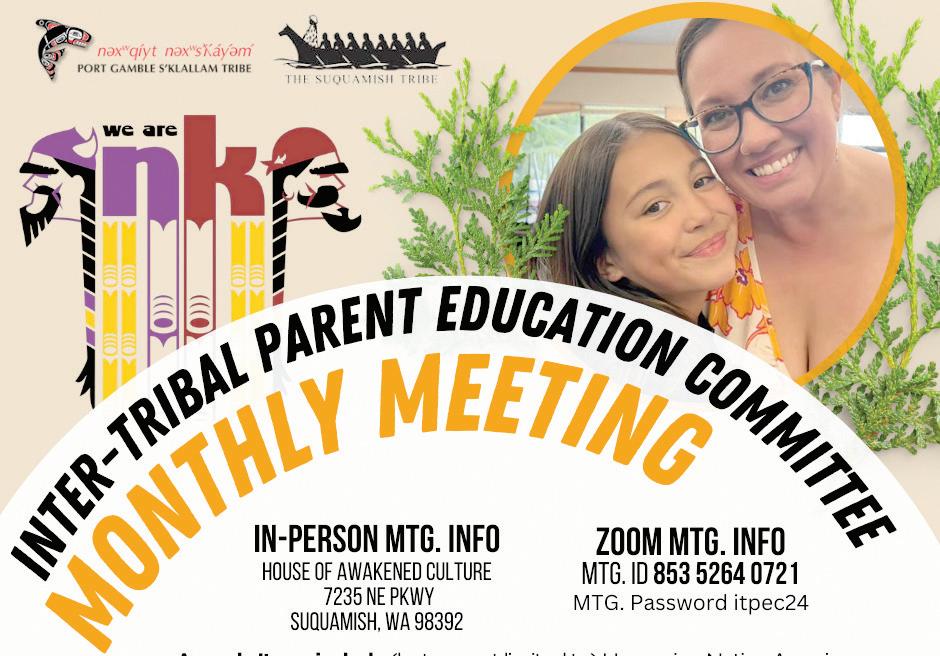
Family & Friends Center
Main phone: (360) 394-8576
Director: Barb Santos
Email: fandfcenter@suquamish.nsn.us
The Family & Friends Center serves tribal community youth ages 10-18, and is open weekdays 10am to 6pm. The center offers after-school snacks and various activities throughout the week. As the school year unfolds, the center also hosts study tables in coordination with the academic coaches and tutors.
Parents/guardians must coordinate with the appropriate school if their youth want to take the school bus from their school to the Family & Friends Center. Afternoon transportation to the homes of participating youth is provided, within the boundaries of the Port Madison Reservation.
All youth participating in Family & Friends Center after-school activities and other events must have required paperwork on file.
Higher Education
Program Manager: Kali Chargualaf HigherEd@Suquamish.nsn.us / (360) 394-1328
For Suquamish Tribal members looking to further their education, the Suquamish Tribe provides assistance to attend college, technical schools, and other eligible institutions of higher learning.
Within available budget, Suquamish Tribal members residing in Kitsap County at the time of application can receive up to $25,000 per academic year. Those in the rest of Washington state can receive up $10,000 per academic year.
Funding can be used for tuition, fees, books, and supplies.
The Higher Education program also provides GED assistance. “We can provide funding for practice tests, supplies, GED study books, and testing.” There are also two GED tutors available through the program.
Meet your Academic Coaches
Suquamish Elementary School
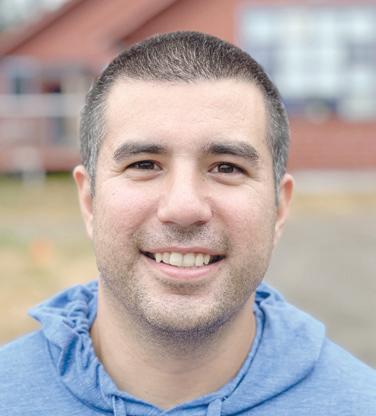
Chris Miller (360) 900-6330 chrismiller@suquamish. nsn.us
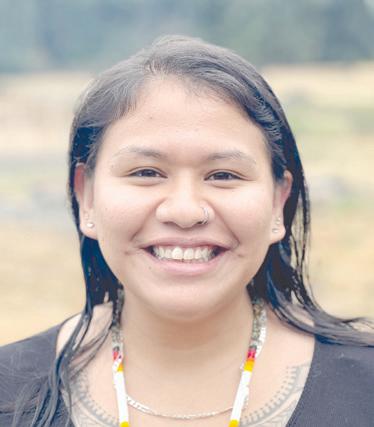
Napua Korsak (360) 710-0631 nkorsak@suquamish. nsn.us
Kingston Middle School
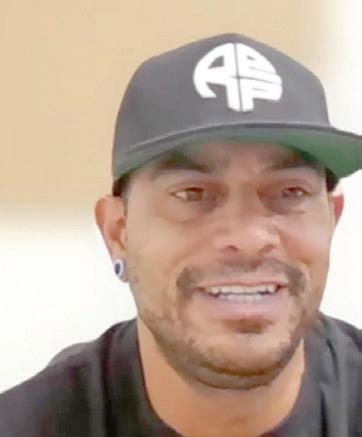
Tony Ledesma (360) 340-1507 tledesma@suquamish. nsn.us
Kingston High School
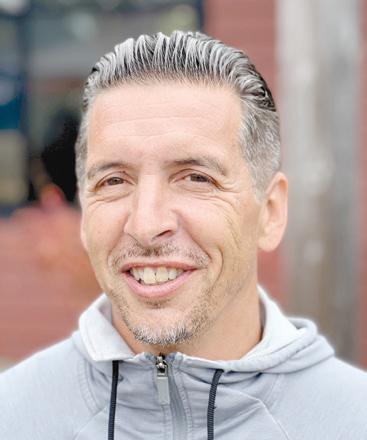
Charles Deam (360) 850-8014 cdeamjr@suquamish. nsn.us
Suquamish Tribe provides four full-time academic coaches embedded in the K-12 public schools in North Kitsap. In a Lunchtime Forum in late August, the four coaches talked about the services they offer Suquamish students.
“Our goal is to support and advocate for Suquamish tribal students and families to help ensure academic needs are being met,” says Chris Miller, who’s going into his 12th year as an Academic Coach at Suquamish Elementary School. “It’s not only about academic success, but we want the kids to feel confident in their abilities, and that they belong at the school.”
Coaches can also help parents keep tabs on student progress and attendance.
“We also do lunch dates with kids,” says Napua Korsak, another Academic Coach at Suquamish Elementary, who most kids know simply as Miss K. “The kids really appreciate that kind of social emotional support, and being seen as a whole student. Their development really thrives from just getting that one-on-one time with us.”
Charles Deam, who in addition to being the Academic Coach at Kingston High School is also the Girls Varsity Basketball Coach, says his office has become a kind of safe haven for tribal students.
“It’s a place where the students can just come in and get a quick reset, or get help with work or just vent.
Deam says there’s “no room for error” when it comes to meeting graduation requirements. “So if they fail a class, I work with the administration to help them make that up. Something that we’re trying to do right now is set up credit retrieval through the Suquamish Tribe as well. That will be huge for the academic success of some of our students, because that’ll give us more creative ways for them to make up credits.”

